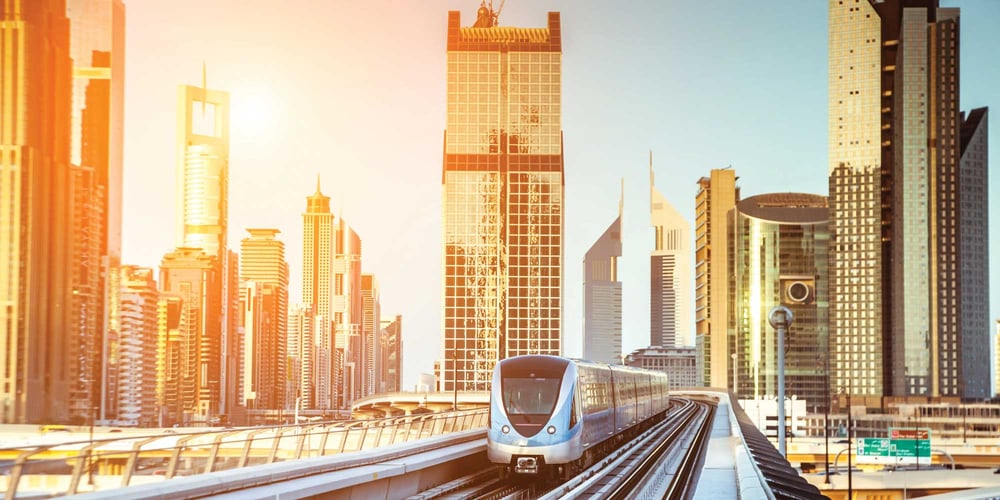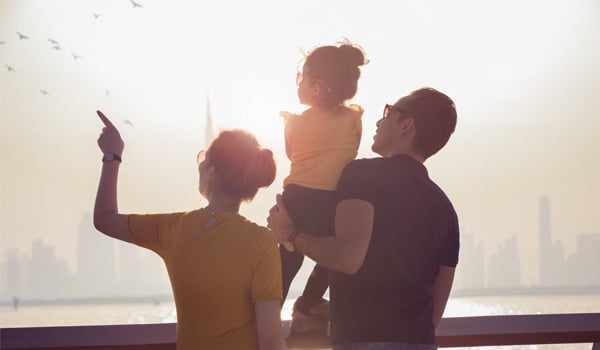Whether you're considering a move to Dubai to set up a business or simply to capitalise on lucrative job opportunities, it's crucial to have a current understanding of the cost of living in the city.
As Dubai continues to flourish as a vibrant hub of commerce and innovation, the dynamics of its living expenses have evolved significantly. The cost of living in Dubai has seen a slight rise by 2023, but is still far below other popular expat hubs like Hong Kong and Singapore. This is reflected in Mercer’s annual Cost of Living Survey in 2023.
City Ranking in Cost of Living
Compared to living in some of the world’s major expat hubs like Hong Kong, Singapore, Zurich, and New York, Dubai costs far less in terms of cost of living.
To put this price difference into perspective, here is how Dubai stacks up against these cities:
|
Location |
Single person monthly cost without rent |
Average rent in city centre (1 bedroom) |
Taxi Fare (1km) |
Petrol (1 litre) |
|
Dubai |
AED 3,965.3 (USD 1079.73) |
AED 7,068.17 (USD 1924.62) |
AED 3.00 (USD 0.82) |
AED 3.23 (USD 0.88) |
|
Hong Kong |
AED 4,053.4 (USD 1103.72) |
AED 8,311.05 (USD 2263.05) |
AED 4.46 (USD 1.21) |
AED 10.47 (USD 2.85) |
|
Singapore |
AED 4,190.6 (USD 1141.08) |
AED 13,562.39 (USD 3692.96) |
AED 2.74 (USD 0.75) |
AED 8.03 (USD 2.19) |
|
Zurich |
AED 7,106.3 (USD 1935.00) |
AED 9,642.99 (USD 2625.73) |
AED 20.48 (USD 5.58) |
AED 8.41 |
|
New York |
AED 5,561.0 (USD 1514.23) |
AED 13,684.68 (USD 3726.26) |
AED 6.85 (USD 1.87) |
AED 4.14 (USD 1.13) |
Information is from Numbeo (Most updated statistics: June 2023)
In this article, we will dive deeper into the cost of living for expats in Dubai within 4 key areas:
Expenses of Living in Dubai
Living expenses are expenditures that are required for necessary survival. It would consist of housing, food, clothing, healthcare, and transportation, to name a few. Any recreational fees would not be accounted for under living expenses.
When determining living expenses, housing makes up a considerable chunk of the budget. On average about 30% of living expenses will be put into housing, followed by transportation and food, making up 15% each. The monthly expenses vastly differ with family size as well. Here is a small overview for a quick reference for total costs depending on the size of your family.
|
2022 |
2023 |
|
|
Single Person |
AED 3,477.89 (USD 946,88) |
AED 3,965.3 (USD 1079.73) |
|
Family of Four |
AED 11,958.62 (USD 3 255.83) |
AED 13,842.1 |
Information is from Numbeo (Most updated statistics: June 2023)
With more attractions, restaurants, and cultural festivals planned for 2023 in Dubai, there is an even bigger appetite for expatriates to relocate to Dubai. Numbeo data has reflected the increased interest from expatriates with a rise in monthly expenses living in Dubai. The average cost of living for a single person increased by 14.0% in 2023 compared to 2022. The estimated cost of living for a family of four also increased by 15.8%.
Housing, Rental & Utilities
Residential costs will depend on where you choose to live, and where you choose to live in Dubai will be highly dependent on where you will do business.
Here’s a reference of what you can expect in terms of rental costs of a residential property.
|
Type of Apartment |
Cost of rent per month |
|
Apartment (1 bedroom) in City Centre |
AED 7,068.17 (USD 1,924.40) |
|
Apartment (1 bedroom) Outside of Centre |
AED 4,142.20 (USD 1,127.77) |
|
Apartment (3 bedrooms) in City Centre |
AED 13,230.68 (USD 3,602.21) |
|
Apartment (3 bedrooms) Outside of Centre |
AED 8,194.29 (USD 2,230.99) |
Information is from Numbeo (Most updated statistics: June 2023)
The Jumeirah Lakes Tower (JLT) is one of the most popular communities in Dubai. This is a popular district for expats, alongside Dubai Marina, Jumeirah Beach Residence (JBR), and Dubai's Old Town, which all have relatively similar rental prices.
The average rental price for a one-bedroom apartment in JLT is around AED 74,522 (USD 20,298) per year or AED 6,210.2 (USD 1,691.5) per month. Expats choose to live in these areas because of the community, and nearby amenities are usually more suitable for their needs.
Dubai Residential Cleaning Services
Cleaning services for accommodations also fall under the housing category in living expenses. This service is usually provided by hiring domestic help which is quite common in Dubai. The rates vary depending on the basis of cleaning but typically a full-time domestic helper would expect a salary range of AED 2,140 to AED 2,350. (USD 582 - USD 640) per month and a part-time domestic helper that comes in once a week (3-hour service) would cost around AED 440 (USD 120) per month.
Dubai Education Costs
Public Schools
While expat kids are allowed to attend both public and private schools in the UAE, they must pay fees regardless of which type they select, as free government schooling is only available for Emirati nationals. For expats interested in public schools, the annual tuition fee has been capped at AED 6,000 (USD 1,635) per year.
International / Private Schools
Dubai has just over 200 private schools servicing around 300,000 Emirati and expat students. Out of all the emirates Dubai is the only one that has implemented annual tuition caps forbidding schools from increasing their rates at unreasonable amounts every year. International school fees range between AED 12,723 to AED 64,093 (3,464–17,455 USD).
It must be noted that school fees also depend highly on the school location, it varies with a significant deviation, and a complete overhaul can be seen here.
Higher Education
Dubai has 65 colleges with a multitude of different disciplines. They cater to both Emirati and expatriate students. However, public universities in Dubai use Arabic as the medium of teaching whilst most private universities teach using English. The average cost for an undergraduate degree would range from AED 40,000 to AED 100,000 (USD 10,900 - USD 27,333) per academic year. The average cost for a graduate degree would range from AED 50,000 to AED 120,000 (USD 13,6161 to USD 32,680) per academic year.
For a full breakdown on Dubai University fees, click here.
Dubai Transportation Costs

Car Ownership
The cost of buying a car greatly depends on the condition. To give a benchmark, the 2023 Toyota Corolla is the most commonly driven car in the UAE and fetches a price of AED 73,900 . Implementing a regular 20% down payment, a 5-year payback plan, and considering other costs, it would come in at AED 20,800 per year excluding the down payment. However, when buying a used car, depreciation usually takes 20-40% off the total price of the car. As of 2023, a used 2018 Toyota Corolla (3 years old) fetches an average price of AED 50,000.
The price of gasoline varies from AED 2.84 per litre for Special 95 to AED 2.95 per litre for Super 98, which is significantly cheaper than the worldwide average of 4,48 AED per litre.
Public Transportation
|
Transportation Fares/Prices in Dubai |
Average Cost |
|
Taxis (per 1 km) |
AED 3.00 (USD 0.82) |
|
Buses (single ticket) Within 1 Zone 2 Adjacent Zones |
AED 4 (USD 1.09) AED 6 (USD 1.63) AED 8.50 (USD 2.32) |
|
Buses (monthly ticket) For 2 Zones For all Zones |
AED 140 (USD 38.12) AED 230 (USD 62.63) AED 350 (USD 95.29) |
|
Average price of 1 L petrol |
AED 2.90 (USD 0.79) |
Information is from Numbeo (Most updated statistics: June 2023)
In the JLT area, there are two Dubai Metro stations making it extremely convenient for employees, residents and visitors to access areas in the premium district, DMCC. There is also a bus service that travels around the community with stops throughout.
For more information on Public Transportation in Dubai, you can visit the Dubai government's official website.
In the JLT area, there are two Dubai Metro stations making it extremely convenient for employees, residents and visitors to access areas in the premium district, DMCC. There is also a bus service that travels around the community with stops throughout.
For more information on Public Transportation in Dubai, you can visit the Dubai government's official website.
Dubai Healthcare & Insurance
Dubai Health Authority has implemented legislation where all residents, including expats, must have private medical insurance. While locals can be covered under the government-funded scheme, expats will need to be covered under private health insurance schemes, which are usually purchased through their employers.
Dubai is especially recognised for its high-standard healthcare system. As an expat, you will be able to take advantage of both public and private healthcare facilities.
Health Card
While Dubai’s medical public facilities are free for locals, expats can receive a 50% discount with a health card. Health card fees are as follows:
- Expatriate Fee up to 10 years – AED 120 (USD 32.67)
- Expatriate Fee from 18 and above – AED 320 (USD 87.12)
- Nationals Fee up to 10 years – AED 25 (USD 6.81)
- Nationals Fee from 18 and above – AED 120 (USD 32.67)
The above fees are one-time payments to obtain a health card. Health cards must be reissued in place of an expired one (dependent on age). To apply for a health care card, expats can visit the Dubai Health Authority website.
Job Loss Insurance
Dubai now offers an extra layer of financial protection for expats against sudden job loss. The Involuntary Loss of Employment (ILOE) scheme, effective from 2023, provides income protection for the first three months after an unexpected job loss.
The insurance premiums for the ILOE scheme are affordable and tiered according to your basic salary:
- For salaries up to AED 16,000 (4,355 USD):
- AED 5 (USD 1.36) per month/AED 60 annually (USD 16.33)
- For salaries more than AED 16,000 (4,355 USD):
- AED 10 (USD 2.72) per month/AED 120 annually (USD 32.67)
Only Dubai Insurance is authorized to issue ILOE policies. Subscribers can receive 60% of their average basic salary over the last six months before job loss, paid within two weeks from the date of the claim.
So, as an expat looking to make your way in Dubai, the ILOE scheme offers you a greater sense of security as you navigate the city's vibrant professional landscape. It's not just the luxury lifestyle that makes Dubai appealing, it's also the comprehensive social support structures like the ILOE.
Living in Dubai: Is it Really That Expensive for Expats?
Dubai has become a top contender for cities to live in for expats, yet remains one of the more affordable expat destinations.
Thinking of moving to Dubai for business? If you want to learn more, download our free 'Dubai Free Zone Guide' to learn everything you need to know about moving and setting up in the right free zone.

